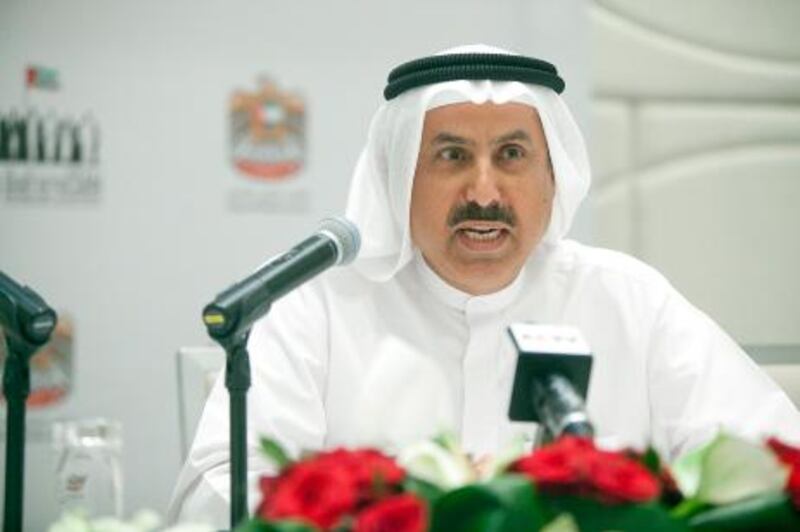ABU DHABI // The country is at an employment crossroads and faces difficult choices in cutting the jobless rate, Saqr Ghobash, the Minister of Labour, said yesterday.
Mr Ghobash called for a frank and open discussion about labour law and how to reduce the gap in salaries and benefits between the public and private sectors, widely perceived as a disincentive to Emiratis.
The minister urged a national debate on proposals such as a guaranteed two-day weekend and a government supplement for Emirati salaries in the private sector, and the creation of an unemployment insurance scheme.
"We are now at a crossroads," he said, "and we need educated and informed discussions so we can make the right decision. We are waiting to hear what the people have to say."
Thirty thousand Emiratis - about 11.8 per cent - are unemployed, and 10,000 to 15,000 of those are in Abu Dhabi. Of more than four million people employed in the private sector only 20,000 are Emirati, and 65 per cent of those work in banking.
Hind Khoory, 24, is typical of young Emiratis affected by the issue. In 2011 she graduated with honours from Zayed University with a bachelor's degree in IT network security.
She has no preference as to a private or public sector job, but after 15 months of unemployment has all but given up on finding a career.
"I have attended career fairs and had various interviews in the public and private sector, only to be told the same story: there are no positions open in my field," she said.
Mr Ghobash said the issue had become serious only in the past few years. "For over 40 years the UAE - GCC in general - saw no need to amend the law. The public and private sector seemed to be moving side by side, and Emiratis were finding attractive jobs - especially in the Armed Forces or Ministry of Interior," he said.
"But in the past couple of years we've found that things have become polarised. It looks like we built two separate job markets: one in the government for Emiratis, and one in the private sector for everyone else."
Potential changes to the law should address the benefits in the private sector, he said. Government jobs tend to have higher salaries, shorter work days, longer holidays and better job security.
One of Mr Ghobash's proposals is to give the private sector a guaranteed two-day weekend, but increase the work day from eight hours to nine.
The ministry estimates the public sector has 15 public holidays and 104 weekend days a year, for a total of 119 days off, while the private sector has 10 public holidays and 52 weekend days, which amounts to 62 days off.
"By giving the private sector a two-day weekend we reduce the gap to just five days. And by extending the workday by one hour, the employer is only reducing three working hours a week, which only amounts to a few days a year," he said.
Ministry figures also suggest salaries in government can be up to three times more than those in the business world.
"No doubt there is a huge gap between the salaries," said Mr Ghobash. "We have been told by employers in the private sector that salaries in the public sector are unrealistic. We accept this criticism. But we need economists to study this and see if it's true and by what factor."
Government may look at supplying the private sector with supplements to Emirati salaries, but they will have to meet certain requirements and ensure the aid is going to the salaries and not the profit margin.
"In Kuwait, the government covers a bracket of basic allowances it feels its citizens must have. This eases some of the burden on the private sector, and makes the salaries in the public and private sector more balanced," Mr Ghobash said.
To address the issue of job security in the private sector, the minister proposes creating unemployment insurance for Emiratis.
"I prefer insuring against loss of employment to issuing unemployment benefits," he said. "Unemployment benefits work if your demographic is 90 per cent citizens. We'd rather have something that encourages employment."
Mr Ghobash said the existing labour law was comprehensive and clear, but: "There is room for improvement, but we need to carefully pinpoint these areas of improvement."
Amending laws can take anywhere from five to eight years to complete, he said.
malkhan@thenational.ae
Two-day weekend for UAE private sector but longer working day, says minister
The UAE is at an employment crossroads and faces difficult choices in cutting the jobless rate, says Saqr Ghobash, the Minister of Labour.

Editor's picks
More from the national





